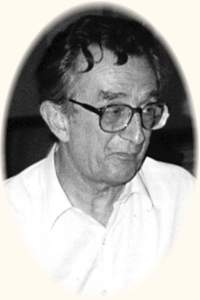|
|
|
László Lator
|

László Lator (1927 -)
Born in Tiszasásvár in South-eastern Hungary, Laszlo Lator graduated in 1951 from the University of Budapest with a degree in Hungarian and German Language and Literature.
He worked as a grammar-school teacher from 1950 until 1955, when he was appointed Contributing Editor and subsequently Editor-in-Chief of Európa Kiadó [Europe Publishing House], a position he has held throughout the changing fortunes of Hungarian politics. In 1992, following the collapse of Communism, Lator became one of the founding members of the Széchenyi Academy of Arts and Literature.
An outstanding and prolific translator from numerous languages Lator is also one of Hungary's most eminent literary critics. His own poetry is expressive of the anxieties of World War II, the historical and biological horrors of this age, despair, and concern about his own fate and his chances of self-realization. His early poetry, rich in Biblical allusion, evinces the influence of religious expressionism. Some critics associate his name with the urbanist tradition of the New Moon [Új Hold] generation outlawed by the Communists, while others count him amongst the cultivators of populist lyricism.
Lator received the Attila József Prize in 1972 and the Kossuth Prize in 1995.
TREE ON THE ROCKFACE
How many million seeds had gone to waste
before this cripple of a tree was placed
among the gargoyles in a moonscape zone's
sheer verticality of sterile stones?
What whim constrains it there, to vegetate
inside the cruel prison of its fate?
What crafty mind, what stubborn-headed will
had tortured, twisted, bludgeoned it until
the tender-fibred, sickly-shapen tree
accepted its appaling destiny?
Its blackened bark is witness to the strife,
the daily battles for its very life:
enormous scars, an ulcerated cyst,
a broken limb, the taproot in a twist.
But in the terror-stricken gnarls of black,
defiant leafy arches answer back,
through labyrinthine fissures in the stone
a root crawls thrusting, hardened to a bone,
a thirsty craving curves it at the tip,
what agony, what bliss it is to sip
the juices and the scanty salt there is
in those sclerotic stone-capillaries.
Explosive charges swell within the veins
to burst the leaf-buds' delicate membranes,
the foliage is bathing in a blaze
of shining frothy fluxes, inner rays,
and as the savage, sizzling forces soar,
they course across the creature's every pore.
One joy was granted to the stunted tree,
one undivided glow and gloom: to be;
to strain and quiver like a line that spans
the weightless void and hell's granitic hands
where blessed joy and dreadful panic mate;
to fight a never-ending long debate
against itself with two-way arguments,
at once the prosecution and defence.
What striking symbol: on the desert stone
the biblical tree growing up, alone,
as cheap incentive tossed into the huge
mind-numbing silence after the Deluge!
Its ravaged roots and branches cry in grief,
its beauty, loneliness defy belief.
|
|
|